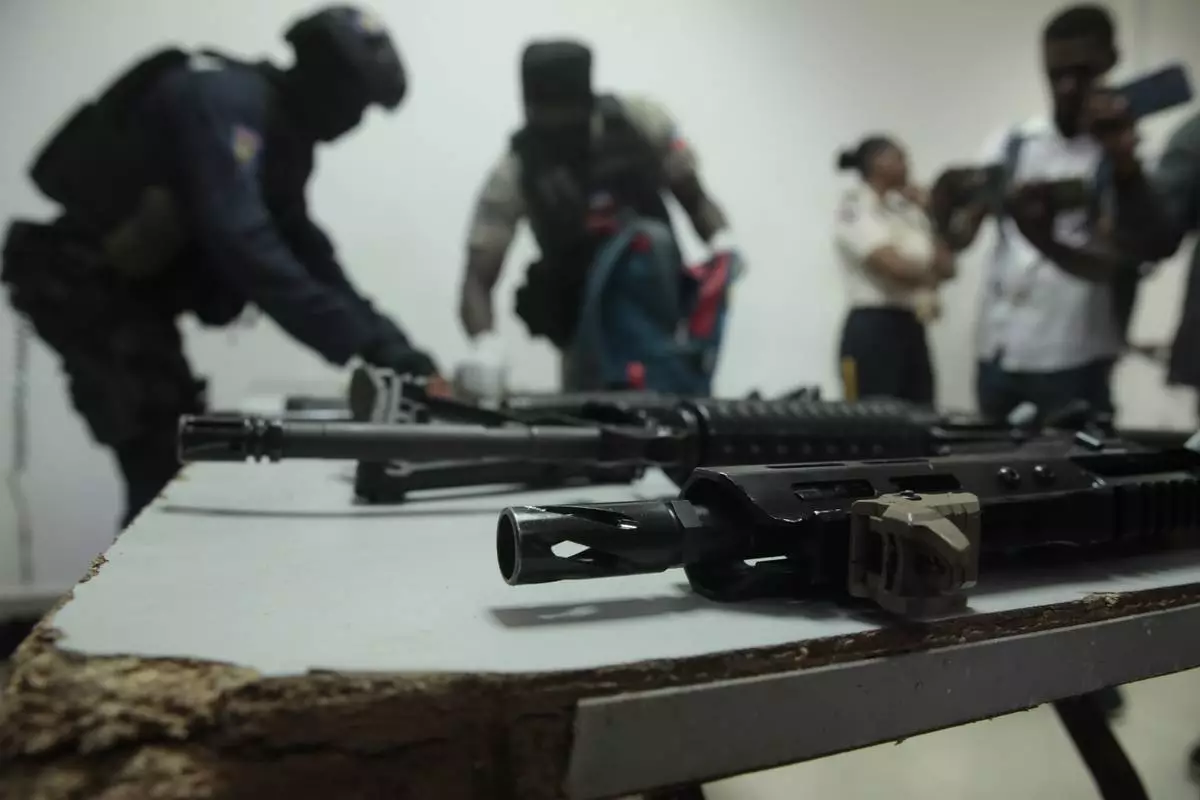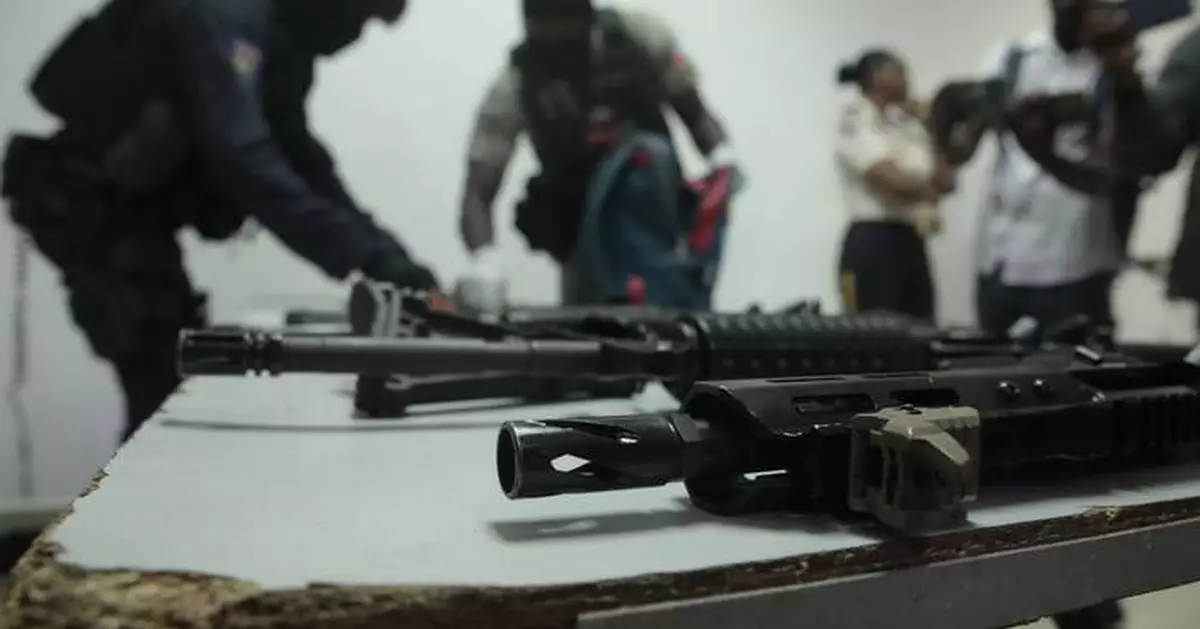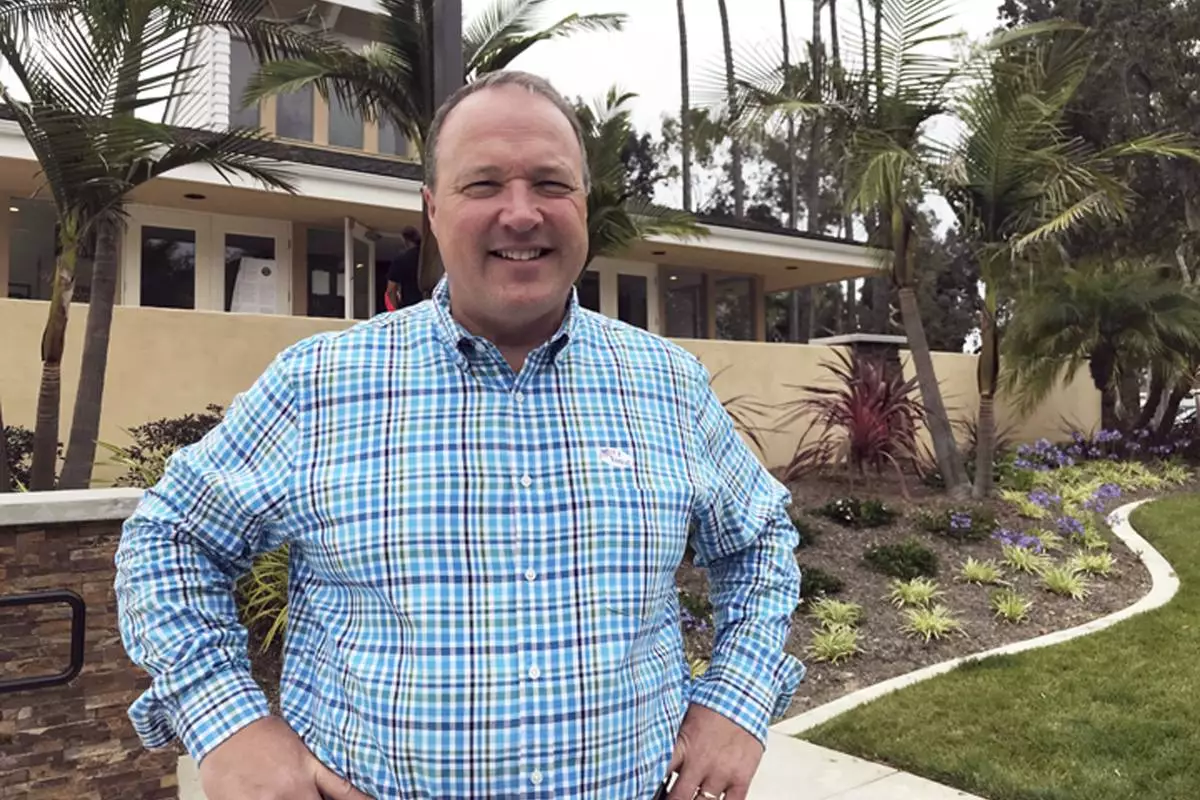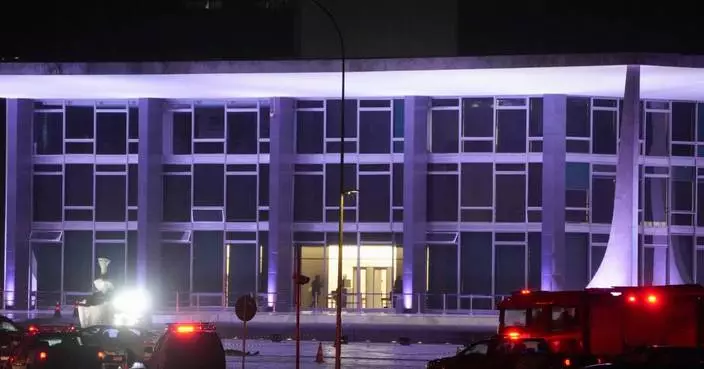SAN JUAN, Puerto Rico (AP) — Dozens of soldiers and police fanned out across a neighborhood on a recent night in the Turks & Caicos Islands just days after the archipelago reported a record 40 killings this year.
They were on the hunt for criminals and illegal weapons fueling a surge of violence across the Caribbean as authorities struggle to control a stream of firearms smuggled in from the U.S.
Half an hour into the Oct. 30 operation, one driver tried to run authorities off the road as he tossed a handgun into the bushes.
“Rest assured, we remain committed to disrupting the flow of illicit guns,” Police Superintendent Jason James said hours later.
But the flow is too strong, with illegal firearms blamed for an increase or a record number of killings in a growing number of Caribbean islands this year, including Trinidad and Tobago and the Bahamas.
No Caribbean nation manufactures firearms or ammunition or imports them on a large scale, but they account for half of the world’s top 10 highest national murder rates, according to a statement from U.S. Sen. Chris Murphy of Connecticut.
In a letter sent to U.S. legislators in late September, New York’s attorney general and 13 other colleagues across the U.S. demanded new measures to stop the flow of guns, noting that 90% of weapons used in the Caribbean were bought in the U.S. and smuggled into the region.
“American-made guns are flowing into Caribbean nations and communities and fueling violence, chaos, and senseless tragedies throughout the region,” wrote New York Attorney General Letitia James.
In mid-2023, the U.S. government appointed its first coordinator for Caribbean firearms prosecutions to help curb weapon smuggling from the U.S. to the region, with the U.S. Bureau of Alcohol, Tobacco, Firearms and Explosives already tracing firearms seized in the Caribbean.
Last year, 266 firearms seized in the Bahamas were submitted to ATF, along with 234 firearms from Jamaica, 162 from the Dominican Republic and 143 from Trinidad and Tobago, according to the agency’s most recent data.
The majority are handguns, followed by semiautomatic pistols.
The information gleaned from recovered weapons can help authorities in the U.S. determine where and when they were bought, triggering a domestic firearms trafficking investigation.
But it’s a struggle to stop the flow of weapons, with smugglers disassembling them and hiding their parts in sea-bound containers.
“As much as you try to harden the infrastructure at the official ports, it is essentially like trying to plug a sift,” said Michael Jones, executive director of the Implementation Agency for Crime and Security at Caricom, a Caribbean trade bloc.
Homicides are not the only thing rising across parts of the Caribbean. There’s an increase in privately made firearms using 3D printers, and gunmen are using higher caliber weapons and becoming more brazen, with younger and younger people committing crimes, Jones said.
Killings are now occurring during the day, and not necessarily via a drive-by shooting, he said.
“You have some who are so bold as to walk up to an individual, put the gun to their head, and walk away,” he said.
Jones said gangs are franchising across the region, with gunmen sometimes traveling to a certain island to commit the crime and then leaving.
Gangs also are preying on young people because they lack opportunities, Jones said.
“Even now, there are some countries that will tell you they don’t have a gang problem,” he said.
On a recent afternoon in late October, a 42-year-old employee with Trinidad and Tobago’s Forestry Division was fatally shot while in a car near his brother’s house.
He was one of six people killed in the span of 48 hours, raising the death toll in the twin-island nation of 1.4 million people to 518 compared with 468 killings last year. The sister island of Tobago alone reported a record 20 killings — in mid-August — and still counting.
During a recent budget presentation, Prime Minister Keith Rowley urged lawmakers to draft a bill to ban assault weapons and high-powered rifles.
Experts say many killings in the Caribbean are a result of gang-on-gang violence, but civilians are increasingly getting caught in the crossfire.
“The proliferation of privately made rifles and semi-automatic pistols, combined with the circulation of conversion devices, increases the likelihood that significantly more rounds will be fired during criminal shootings, which may in turn increase the risk of multiple injuries, including among bystanders,” warned a June report by Caricom’s Impacs, the Small Arms Survey and others.
One of those bystanders was a 4-year-old boy shot in the leg when gunfire erupted outside his preschool in Trinidad in late September. The bullet fractured one of his bones.
In the Bahamas, a man holding his 8-month-old baby was shot and killed in early October as he stepped out of his car, where another 6-year-old child was sitting. Both children were unharmed.
It was the 90th slaying of the year for the Bahamas, which so far has reported a 23% increase in killings compared with last year. Overall crime is down, though, according to government statistics.
Jamaica, meanwhile, has one of the world’s highest homicide rates among countries with reliable statistics: 53.3 per 100,000 people. As of Nov. 2 police statistics show 960 people were reported killed, a nearly 20% drop from last year and far from a record 1,683 homicides reported in 2009, but violence persists on the island of 2.8 million people,
“It is of grave concern to us,” Prime Minister Andrew Holness said at a press conference in November about large-scale shootings.
In late October, five men were killed at a soccer game in a Kingston neighborhood that previously struggled with gang violence. It was the island’s latest massacre.
In a visit to the neighborhood, Holness noted police have reduced the number of gangs from almost 600 to 150.
While Jamaica has passed anti-gang legislation to crack down on violence, the Turks & Caicos Islands approved a law in early October that allows authorities to offer immunity or reduced sentences to those who provide key information about a crime.
Police in Jamaica, Trinidad and Tobago and the Turks & Caicos Islands did not respond to repeated messages for comment.
Most of the firearms smuggled into the Caribbean come from Florida, followed by Georgia and Texas. They usually are shipped directly to an island, although sometimes they first go through a port in Jamaica or the Bahamas.
Firearms have been found inside items ranging from cars to washing machines.
“It’s a big problem,” said James Sutton, police commissioner for St. Kitts and Nevis. “We’re asking the U.S. to do more.”
The twin-island nation has reported at least 27 homicides, the vast majority committed with guns. It’s creeping close to a record 32 killings in 2016.
Haiti remains the Caribbean nation hardest hit by smuggled weapons that feed gangs controlling 85% of the capital of Port-au-Prince.
“Despite the strengthening of the arms embargo measures, arms trafficking continues unabated,” stated a U.N. Security Council report released in late October. “Gangs have been increasingly procuring larger caliber weapons, resulting in more damage and a posing greater challenge to the police and the (U.N.-backed) mission.”
The report said trafficking from the U.S. to Haiti is not a sophisticated process, noting there are numerous networks often based on family or social connections and that the “vast majority” of the 200 containers heading from South Florida to Haiti every week are not inspected.
“Despite being brought into the country in small quantities, this recurrent ‘ant trafficking’ quickly builds up, leaving the country awash with weapons,” the report said.

FILE - Police display weapons and equipment seized from gangs during a press conference at police headquarters in Port-au-Prince, Haiti, April 26, 2023. (AP Photo/Odelyn Joseph, File)












